|
|
|
Sort Order |
|
|
|
Items / Page
|
|
|
|
|
|
|
| Srl | Item |
| 1 |
ID:
103133


|
|
|
|
|
| Publication |
2009.
|
| Summary/Abstract |
The reconstruction of Afghanistan is in part dependent upon the reintegration of Afghanistan into the international community. Reintegration, in turn, is dependent upon Afghanistan's trans-border infrastructure of communication, trade, transport, water, power and investment. Accordingly, increased regional economic cooperation is a key element of Afghanistan's reconstruction. This article analyses regional economic cooperation in the South and Central Asian region in terms of logic, institutions, actors, and expectations. The article argues in favour of inclusiveness to enlarge the number of beneficiaries of economic benefits of regional economic cooperation while avoiding the pitfalls of risky strategies of faulty collective action.
|
|
|
|
|
|
|
|
|
|
|
|
|
|
|
|
| 2 |
ID:
073039


|
|
|
| 3 |
ID:
060280
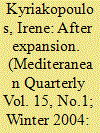

|
|
|
| 4 |
ID:
116571
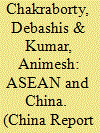

|
|
|
|
|
| Publication |
2012.
|
| Summary/Abstract |
ASEAN and China share a complex relationship in economic terms; while they collaborate in several spheres, conflict of interests is not uncommon either. The proposal for an ASEAN-China Free Trade Agreement (ACFTA) was floated in 2000, and the agreements covering merchandise trade, services trade and investment collaboration were signed in 2004, 2007 and 2009 respectively. ASEAN countries agreed to consider China as a market economy in the course of the negotiations and the ACFTA has resulted in several benefits for both parties, including tariff reduction on substantial number of product lines, considerable growth in merchandise and services trade volume, deepening of intra-regional production networks, regional cooperation on infrastructural development and so on. However, rapid growth of Chinese imports in ASEAN markets and expanding trade deficit generates apprehension in the grouping over potential domestic restructuring. Subisidies provided by the Chinese government to its domestic players also compound the problem. This article concludes that ASEAN countries need to augment their competitiveness through coordinated efforts on the one hand, and jointly negotiate with China to curb the disruptive effects of the latter's incentive programmes, on the other.
|
|
|
|
|
|
|
|
|
|
|
|
|
|
|
|
| 5 |
ID:
090602
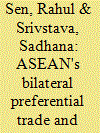

|
|
|
|
|
| Publication |
2009.
|
| Summary/Abstract |
The phenomenon of proliferation of preferential trade agreements, bilaterally and regionally, was particularly more pronounced both in the aftermath of the regional financial and economic crisis that affected East Asia in 1997-98 and in the inability of the WTO to yield any substantial outcome to improve growth prospects of the Asian economies. This paper analyses the implications of ASEAN's ongoing FTAs and examines its role in fostering deeper economic integration within ASEAN and in Asia. It analyses the evolution and characteristics of FTA proliferation in ASEAN, identifying major trends. The paper argues that in their present state, if not properly designed and managed, there are valid concerns that these FTAs could end up becoming a stumbling block towards integration efforts. Implementation integrity among FTA members therefore remains a key to its success, and empirical and policy research needs to be much more forthcoming in this area in order to fully understand the economic ramifications of these FTAs.
|
|
|
|
|
|
|
|
|
|
|
|
|
|
|
|
| 6 |
ID:
065143
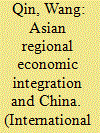

|
|
|
| 7 |
ID:
073609
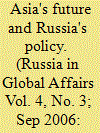

|
|
|
|
|
| Publication |
2006.
|
| Summary/Abstract |
The formation of Russia's new policy toward the Asia-Pacific countries is impossible without transforming its foreign-policy thinking, which has been traditionally focused on the Euro-Atlantic space. Russia must stop viewing Asia as something alien.
|
|
|
|
|
|
|
|
|
|
|
|
|
|
|
|
| 8 |
ID:
101927
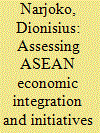

|
|
|
| 9 |
ID:
138376


|
|
|
|
|
| Summary/Abstract |
Economic Integration of BIMSTEC has immense potentiality; in opposite to SAARC’s alienated stand, BIMSTEC is seems to be more inclusive and inter regional in nature. Two of its member states, Myanmar and Thailand are the members of ASEAN. So, it may work as a bridging link between the regional groupings. Intra regional trades among the SAARC countries are too low, primarily because of the absence of specific directions to move on.
|
|
|
|
|
|
|
|
|
|
|
|
|
|
|
|
| 10 |
ID:
075250
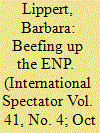

|
|
|
|
|
| Publication |
2006.
|
| Summary/Abstract |
Lippert examines more broadly EU policies towards its eastern neighbours, suggesting an alternative model with which to embed these countries in the EU system of governance. Lippert argues that a path dependency and the lack of a foreign policy focus lie at the root of the inbuilt fallacies of the ENP. Indeed, the ENP in principle purports to envisage a new type of relationship, distinct from the model of economic integration (for example, the European Economic Area) or that of accession or of association/partnership. Yet in practice, having been articulated as a form of "membership minus" that denies any form of institutional participation, the ENP cannot significantly contribute to the modernisation and stabilisation objectives to which it aspires. To escape this bind, Lippert suggests that, for those eastern neighbours who could in principle have the option of membership but are in practice far removed from it, the EU, in addition to its bilateral contractual ties, should establish an overarching institutional framework: a European Confederation of Tasks (Confed Europe). Confed Europe could act as an institutional process, tackling and striving to reach a common purpose on key policy issues in the political, economic and security realms.
|
|
|
|
|
|
|
|
|
|
|
|
|
|
|
|
| 11 |
ID:
144565
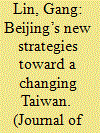

|
|
|
|
|
| Summary/Abstract |
Beijing’s new strategies toward Taiwan are informed by neo-functionalism derived from European experiences, assuming that economic integration will eventually lead to political accommodation and integration. Despite the surprising Sunflower Movement and the fiasco of the Chinese Nationalist Party (KMT) in the 2014 local elections, Beijing will try its best to maintain the momentum of peaceful development of cross-Strait relations. Facing a brand new Taiwan that seems an oddity to the mainland, however, Beijing has adapted to ‘the new normal’ with a slower pace, refocusing on the economic and cultural issues. Whether or to what degree Beijing will change its asymmetric engagements with the two main parties on the island, however, is contingent upon whether the KMT and the Democratic Progressive Party (DPP) can reach a balance of power domestically and whether their policies toward the mainland converge rather than diverge. At any rate, Beijing is likely to pay more attention to ordinary people’s feelings about cross-Strait economic and cultural exchanges and consider quality of cross-Strait exchange as more important than quantity of activities.
|
|
|
|
|
|
|
|
|
|
|
|
|
|
|
|
| 12 |
ID:
092637
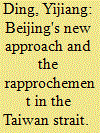

|
|
|
| 13 |
ID:
130610
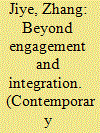

|
|
|
|
|
| Publication |
2014.
|
| Summary/Abstract |
As part of its new strategy of "retuming to the Asia-Pacific region", the A Obama administration has adopted some tough economic policies towards China, notably promoting the Trans-Paci?c Partnership (TPP) and attempting to establish new rules of international trade and investment aimed at strengthening economic ties with other Western countries through the Trans-Atlantic Trade and Investment Partnership Agreement(TTlP ), both of which tend to compress the geopolitical space for China's economic rise. The administration is also using a 'green barrier' to suppress the development of China's high-tech industry, and using economic diplomacy and investment restrictions against Chinese state-owned enterprises. This paper seeks to examine and analyze the causes of shifts in the U .S. economic strategy towards China.
|
|
|
|
|
|
|
|
|
|
|
|
|
|
|
|
| 14 |
ID:
182589
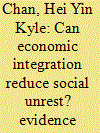

|
|
|
|
|
| Summary/Abstract |
When dealing with autonomous regions, states may utilize Unionist Economic Integration (UEI) programs to forge a stronger sense of unionism. However, the literature has not been able to explain why UEIs work differently across regions. With the identical UEI implemented in Macau and Hong Kong, Macau seems to be firmly within Beijing's grasp, yet protests in Hong Kong are still intensive. Why is economic integration effective in appeasing some regions, but not others in the same polity?
I argue that what makes UEI effective in appeasing a region is the region's economic dependence on the national center. UEIs add to the expected cost of contention, and thus high economic dependence sets that baseline to a higher degree, leading to effective appeasement with UEIs. I illustrate my argument with empirical analyses of two original datasets of protest counts and discontent with authoritarian institutions in Hong Kong, Macau, and Chinese provinces.
|
|
|
|
|
|
|
|
|
|
|
|
|
|
|
|
| 15 |
ID:
072619
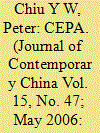

|
|
|
|
|
| Publication |
2006.
|
| Summary/Abstract |
Since 1979, when Mainland China began to open up its economy, a process of economic integration has been going on between Hong Kong and Mainland China. The return of Hong Kong to Mainland China in 1997 speeded up the integration process. China's entry into the World Trade Organization (WTO) at the end of 2001 further intensified the integration process. In June 2003, CEPA (Closer Economic Participation Arrangement) was signed between Mainland China and Hong Kong, which set a further important milestone in the economic integration between them. In June 2004, the concept of regional economic integration was inaugurated in the Pan-Pearl River Delta Regional Cooperation and Development Forum. This article attempts to review the economic integration process after the signing of CEPA. Issues related to the implementation of CEPA are also examined and discussed. It is hoped that both the Hong Kong business sector and potential foreign investors can have a comprehensive picture of CEPA so that they can design appropriate actions to benefit most from CEPA.
|
|
|
|
|
|
|
|
|
|
|
|
|
|
|
|
| 16 |
ID:
069305
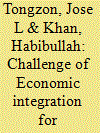

|
|
|
| 17 |
ID:
141620
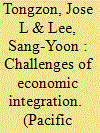

|
|
|
|
|
| Summary/Abstract |
The Association of Southeast Asian Nations (ASEAN) has agreed to establish an ASEAN single-shipping market (ASSM) by 2015. This paper aims to assess the impediments in achieving this vision and how they can affect the pace of integration. These impediments include the differences in their national shipping capacity, national shipping policies and regulations, and in their quality of shipping-related infrastructure and institutions. Due to these differences, the economic implications are likely to vary and raise important conceptual and implementation issues. The ASEAN experience could contribute to the understanding of shipping market integration and provide some lessons for other countries.
|
|
|
|
|
|
|
|
|
|
|
|
|
|
|
|
| 18 |
ID:
170587
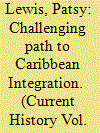

|
|
|
|
|
| Summary/Abstract |
Member states have not always been enthusiastic about implementing their obligations to further economic integration
|
|
|
|
|
|
|
|
|
|
|
|
|
|
|
|
| 19 |
ID:
140628
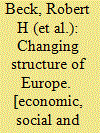

|
|
|
|
|
| Publication |
Minneapolis, University of Minnesota Press, 1970.
|
| Description |
viii, 286p.hbk
|
| Standard Number |
0816605661
|
|
|
|
|
|
|
|
|
|
|
|
Copies: C:1/I:0,R:0,Q:0
Circulation
| Accession# | Call# | Current Location | Status | Policy | Location |
| 004601 | 940.556/BEC 004601 | Main | On Shelf | General | |
|
|
|
|
| 20 |
ID:
100255
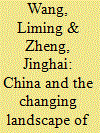

|
|
|
|
|
| Publication |
2010.
|
| Summary/Abstract |
The rapid development of emerging markets is changing the landscape of the world economy and may have profound implications for international relations. China is often regarded as the most influential emerging market economy because, during the last three decades, it has become increasingly integrated into the world economic system and its success and failure now affect the well-being of other nations in the world. As the financial crisis in the US and EU intensifies, the economic prosperity of the world depends to a large extent on the sustained development of the Chinese economy and other emerging markets, and vice versa.
|
|
|
|
|
|
|
|
|
|
|
|
|
|
|
|
|
|
|
|
|